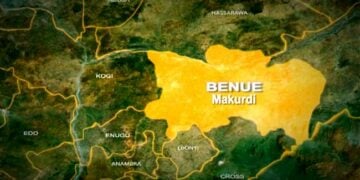A new report has sheds light on the alarming rise in Particulate Matter (PM) pollution in the Ibeju Lekki area of Lagos State, underscoring the urgent need for real-time data collection to aid climate change adaptation efforts in the state and Nigeria.
The report, titled: “The Unseen Risk”, released by the Media Awareness and Justice Initiative (MAJI), detailed findings from its recent study, which analysed air quality data collected between April and September 2024 in Ibeju Lekki area. The data used was collected using Raspberry Pi-enabled devices. A total of 8,044 data sampling entries were collected from the communities. The types of air quality data collected and compiled during this period include PM, humidity, pressure and temperature and thr Air Quality Index (AQI).
Findings of the study showed significant spikes in particulate matter (PM1.0, PM2.5, PM10.0), elevated temperatures, and a marked decline in air quality levels across 10 communities in Ibeju Lekki, including Idasho, Itoke, Lekuru, Mosa, Okesegun, Okeyatta, Okunraye and Olomowewe communities.
The executive coordinator, MAJI, Okoro Onyekachi Emmanuel, at a press briefing, on Tuesday, in Lagos, said, these environmental changes, linked to industrial activities around the area, have far-reaching implications for biodiversity, community health, and Nigeria’s commitments to global climate agreements.
While acknowledging the economic potential of the industrialactivitiesin the area, Emmanuel highlighted contradictions in Nigeria’s energy transition goals. Despite pledging a 20 percent reduction in emissions by 2030 under the Paris Agreement, the country’s continued reliance on fossil fuels exacerbates environmental degradation, the executive coordinator lamented, adding that, Nigeria currently ranks fourth globally in poor air quality and leads Africa in air pollution-related deaths, according to an August 2023 report by Euronews.
MAJI’s factsheet also addresses the lack of environmental data and tools among stakeholders, including civil society groups and local communities. To bridge this gap, MAJI employed low-cost technology to monitor air quality in real time, providing evidence-based insights for policy development.
Emmanuel, however, recommended empirical environmental data collection by government agencies; deployment of real-time environmental monitoring systems in the affected communities; baseline health audits for residents near the industrial area; public disclosure of Environmental and Social Impact Assessment (ESIA) reports and promotion of inclusive dialogue between rural communities and stakeholders.
We’ve got the edge. Get real-time reports, breaking scoops, and exclusive angles delivered straight to your phone. Don’t settle for stale news. Join LEADERSHIP NEWS on WhatsApp for 24/7 updates →
Join Our WhatsApp Channel







